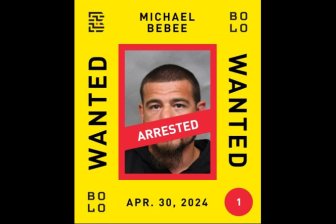The leader of British Columbia’s official Opposition is raising concerns about provincial funding going to a group buying and selling illegal drugs as a response to the toxic drug crisis.

Documents obtained by Global News show that the Drug User Liberation Front (DULF) received $200,000 from Vancouver Coastal Health (VCH) to operate what the group calls a “compassion club” selling heroin, methamphatime and cocaine.

The group buys the drugs on the black market, before sending them for testing in labs at the University of British Columbia or the University of Victoria, then selling them at cost to a small group of drug users.
BC United Leader Kevin Falcon called the situation “totally unacceptable.”
“Why are taxpayer dollars going to a group called the Drug User Liberation Front that is supporting frankly organized crime by buying these drugs on the dark web and then trafficking them in British Columbia,” Falcon told Global News.
“Handing out publicly supplied addictive drugs to people with addiction, decriminalizing hard drugs like heroin cocaine and fentanyl — now supplying drugs to people like the DULF. Does anyone think this is getting good results? Has anyone seen any improvement in our streets?”
The situation has also drawn the ire of federal Conservative Leader Pierre Poilievere, who told Global News it was a “disgrace” the B.C. government was “give hundreds of thousands in tax dollars to illegal drug dealers in addition to decriminalizing hard drugs.”
The BC Coroners Service reported at least 174 people died from toxic drugs in August, the lowest monthly number recorded since June of last year — but still the third-highest August total since the overdose crisis began.
It brought the 2023 death toll to 1,600, on track, with drug toxicity now the leading cause of death among people aged 10 to 59, more than homicides, suicides, accidents and natural disasters combined.

DULF co-founder Jeremy Kalickum told Global News there is no question what his group is doing is controversial. But he said it is a necessary reaction to the ongoing epidemic of drug deaths in the province.
He said none of the provincial funding went to buying drugs, and was instead used up to set up a facility for its compassion club, providing overdose prevention services and hiring administrative staff.
All the money used to purchase drugs was collected through donations, he said.
Kalickum said the reality is that legal or not, people continue to use drugs, and the drugs they do have access to are deadly.
“People are using drugs, but they don’t know how strong they are, they don’t know what’s in them, and they’re overdosing and they’re dying,” he said.
“We needed a compassion club. We needed somewhere for people to come who use drugs to get what they need in known potencies, quantities and quality and not be exploited financially, not be put at risk of violence and to not overdose.”
British Columbia began a three-year pilot project with the decriminalization of drugs in January, which allows the possession of small quantities of a variety of illicit drugs. Buying and selling drugs in quantity, however, remains illegal.
Kalickum acknowledged the group buys its drugs from the black market, and can’t be sure who the money goes to. But he said they do so because they have no legal alternative. DULF has been trying to secure product from a pharmaceutical company for about three years, but has continuously run into barriers, he said.

“We’ve been forced into that position. We’re under no presumption that buying off the black market is a good thing,” he said.
“It also takes money away from organized crime. Because if you think about the dugs we’ve bought – we did buy them from the black market, but we bought them at a repressed price because we bought such big amounts … and if you give that discount to the people who are buying it you are removing that profit that would have been added on top of that.”
DULF estimates that over one year, the organization has diverted about $100,000 from drug dealers through its model.
Along with providing tested drugs of known potency the compassion club, which has about 50 members, is seeking to study what happens to drug users when they have access to clean and affordable drugs.
The group has been tracking outcomes among members for a year, and said as of August 2023 there had been no fatal overdoses. It also reported a 48-per cent drop in negative police interactions, a 50-per cent drop in hospitalizations and a 39-per cent drop in violence.
“We learned that when you give people drugs of known potency and quality and contents, they overdose less, they commit less crime, they go to the hospitals less, they suffer less violence and they report being healthier mentally and physically,” he said.

Those explanations ring hollow for Falcon, who said the province should launch a review of the funding.
“The attorney general should call for an investigation and find out why is it that taxpayer dollars are going to a group involved in criminal activity,” he said.
“Nobody wants people to die of drug overdoses. But for goodness sake, we have to step back for a minute and look at the approach government is taking.”
British Columbia’s Ministry of Mental Health and addictions deferred questions to Vancouver Coastal Health about the funding.
In a statement, VCH said the funding came under the toxic drug public health emergency declared in 2016, allowing medical health officers in the province to take “proactive action to protect people who use drugs” and provide overdose prevention services “in any place there is a need for these services.”
The funding provided to DULF, it said, was for the development and implementation of a drug checking program, training on overdose prevention, and harm reduction supplies and equipment.

“Overdose prevention services and drug checking services are intended for those consuming illegal drugs, due to the unpredictable nature of these substances. A provincial Ministerial order, in the context of a declared Public Health emergency, allows these sites to operate,” it said.
“Outside of services contracted by VCH, the determination of whether any other activities are illegal, and the response to those, is outside the jurisdiction of VCH. ”
Kalickum, meanwhile said he knows the DULF initiative could land him in legal trouble one day, and that he’s welcomes an opportunity to test Canada’s drug laws under the Charter of Rights and Freedoms in court.
“If doing that and saving lives means I am a criminal and I am going to jail, that’s just the way it is,” he said.
“I don’t think it will come to that,” he added, saying he believes the compassion club will more likely end up like B.C.’s now-accepted overdose prevention sites.





Comments